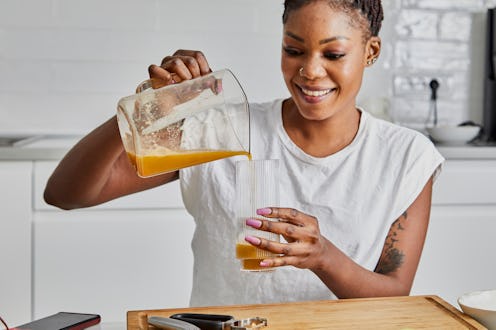Wellness
Does TikTok’s “Adrenal Cocktail” Really Work? An Expert Weighs In
The viral drink supposedly helps fight chronic fatigue.

These days TikTok is brimming with tasty drink recipes that also serve a purpose. From the sleepy girl mocktail to the many hydration hacks on WaterTok, there’s a bevy of elixirs that purport to cure your current ailment. The latest in this lineup is the adrenal cocktail, a creamsicle-flavored drink that supposedly boosts your energy.
The adrenal cocktail, whose hashtag has more than 15 million views on TikTok, is intended for folks for whom exhaustion and burn out is the status quo, even if they get plenty of sleep. It’s named for the adrenal glands, two small, triangle-shaped glands that live above the kidneys, which produce hormones that respond to stress, such as adrenaline and cortisol. When you experience stress, these glands respond by pumping out cortisol, explains registered dietician Jenna Stangland, MS, RD. That’s fine in small doses, but if your body is in a constant state of fight-or-flight, it can overstimulate your glands and eventually lead to symptoms of adrenal fatigue.
This cocktail is said to help set things right via specific nutrients that support your adrenal glands. (The fact it tastes like an orange creamsicle is just a bonus.)
How To Make An “Adrenal Cocktail”
Many users mix coconut water, orange juice, and sea salt, with optional add-ons like cream of tartar, a scoop of collagen, coconut cream, or aloe vera juice. Creator @wholesomelivingwellness opts for:
- 1 cup coconut water
- A splash of aloe vera juice
- The juice of one orange
- A few shakes of sea salt
Check with your doctor to make sure these ingredients work for you, then start sipping.
Does The “Adrenal Cocktail” Actually Work?
Many TikTok users say yes, like @ebbymoyer, who’s been sipping the mocktail so her body can “rest and repair.” Under her video, one commenter wroter, “I’ve been fatigued for eight months. I tried this in desperation today and I feel so much better.” Another noted, “I’ve never had so much energy. Love this!”
According to Stangland, the ingredients in the adrenal cocktail provide glucose, or sugar, for a boost of energy, as well as electrolytes and minerals that help your adrenal glands function. Since these nutrients are in liquid form, they’re easier to digest so they can go quickly into your bloodstream. Here’s how each one works.
Coconut Water
According to Stangland, coconut water is hydrating due to its many electrolytes. “Sipping this mocktail in the afternoon would be prime time, when energy levels may start to drop,” she says. “It would be a better choice than grabbing a cup of coffee.”
Orange Juice
In addition to creating the drink’s creamsicle flavor, the OJ adds glucose and vitamin C. It supports your immune system and acts as an antioxidant to help protect the adrenals against oxidative stress, Stangland says. “Orange juice is also a natural carbohydrate source, so that can provide energy instead of triggering the adrenal glands to stimulate the body’s own glucose production.”
Aloe Vera
If you feel like adding a splash of aloe vera juice to your mocktail, go for it. “Two compounds found in aloe vera are anti-inflammatory compounds,” Stangland says. “These have been shown to lower blood pressure, which in turn would reduce stress on the adrenals.”
Sea Salt
Your body needs electrolytes to stay balanced, especially when you’re stressed. Sea salt contains sodium and potassium, plus a dose of magnesium, which all work together to reduce the stress on your adrenal glands, Stangland says.
Cream of Tartar
Some recipes call for cream of tartar, which is another source of potassium, further helping your body relieve some of the pressure placed on the adrenal glands.
Studies referenced:
Ghosh, MK. (1996). Vitamin C prevents oxidative damage. Free Radic Res. 1996 Aug;25(2):173-9. doi: 10.3109/10715769609149922. PMID: 8885335.
Ismail, I. (2007). Rehydration with sodium-enriched coconut water after exercise-induced dehydration. Southeast Asian J Trop Med Public Health. PMID: 17883020.
Shrimanker, I. (2023). Electrolytes. In: StatPearls [Internet]. Treasure Island (FL): StatPearls Publishing; 2023 Jan–. PMID: 31082167.
Saleem, R. (2001). Hypotensive effect of chemical constituents from Aloe barbadensis. Planta Med. doi: 10.1055/s-2001-18348.
Sources:
Jenna Stangland, MS, RD, registered dietician
This article was originally published on